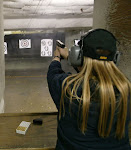Regarding the list I started for "bugging out"...here's one that is more on the order of being prepared for any eventuality.
I wouldn't insist this be carried in town while commuting to work. But it does make sense for any kind of serious travel.
I just hope everyone has a big enough car!
This is from a friend who thinks (and acts) seriously about this stuff.
It sure gets you thinking...
The Gunslinger
"Lesson on the Road:
While driving in Arizona a friend was recently involved in an accident on a remote stretch of I10. A car pulled in front of him, and the two vehicles collided. Both vehicles contained only the driver, and neither were injured seriously, although both vehicles were totaled and non-operable.
Cell reception was marginal, but Arizona DPS officers did arrive a half hour later. By that time, both drivers were standing by the guardrail. One officer asked, ‘Are you okay?' My friend's confused response was, ‘I think so.' On the basis of his response, DPS did not summon an ambulance.
As officers investigated the accident and cleared the wreckage, my friend, clad only in jeans and a T-shirt, began to get cold. The other driver ultimately departed in a taxi. Suddenly, DPS officers received a call about a pursuit in progress some distance away, and they all abruptly left the scene. My friend was precipitously abandoned, shivering, by the side of the road with only his wrecked vehicle, as it was getting dark.
The nearest shelter was a small stop-and-rob a mile away. He called a friend on his cell phone, and was ultimately rescued an hour later, chilled and dazed. He could easily have died from exposure.
Lessons:
I can't say it too often: You're on your own! Never depend upon a "system" or upon anyone else to care about your welfare more than you do.
When traveling by car, always have:
1) Guns, w/cleaning gear
2) Ammunition
3) Blades
4) Flashlight with fresh batteries
5) OC spray
6) Warm clothing
7) Rain coat
8) Bottled water
9) Food (MREs)
10) Cell phone with fully charged battery and charger/adaptor
11) First aid kit (battle dressings, nonprescription pain pills, disinfectant wet wipes, tweezers)
12) Cash
13) Credit cards
14) Telephone credit card
15) Cigarette lighter
16) Road flares
17) Cap/hat
18) Binoculars
19) Tow strap
20) Rope
21) Compass
22) Fire extinguisher
23) Road atlas
24) Leatherman tool
25) Spare tire, jack, lug wrench
26) Duct tape
27) Shovel/Entrenching Tool
28) Jumper cables
29) Utility scissors
30) Sleeping bag and Space Blanket
31) Plastic tarp
32) Hiking boots
33) Mirror
34) Gloves
35) Can of Fix-a-Flat
36) Soft body armor
37) Toilet paper
38) WD-40
40) Whistle
41) Para cord
42) Gasoline siphon hose
43) Funnel
44) Lightsticks
45) Deodorant
46) Body powder
47) Tooth brush
A good "car kit" includes several MREs, several bottles of water, warm clothing and rain gear, as well as your usual "walking gear." When traveling by car, I recommend having a shotgun or military rifle as well as your pistol(s), all, of course, out of sight.
Think of suddenly finding yourself alone someplace far from any kind of help. Imagine that this place is cold, rainy, dark, and occupied by dangerous people and animals. Imagine, in addition, that you're hurt and bleeding. Imagine further that you're going to be on your own for at least several hours or even days with no shelter, no light, and no electricity. If you're prepared, you'll be fine.
A ‘Power Pack’ jump-starter device. It will start a car by itself, and contains a flashlight, 12v power access (cigarette lighter sockets), and an air compressor that will easily reinflate tires. It is the size of a small tackle box, and is available at Wal Mart. You’ll never have to ask some stranger for a jump start.
Other comments:
“I always carry a small backpack, a pair of thick socks, and a set of sturdy, hiking boots.”
“I carry a handheld HAM radio. During emergencies, wire and cell phones may be out, or preempted by authorities, as ours were here after an earthquake several years ago. It was several days before we could communicate normally. Those, like us, who had HAM communications suffered no limitation. You can acquire the license with a week of evening self-study. The exam cost $6.00, after which you are licensed for ten years.”
“I was not a big GPS person, until I had to use one daily overseas. Now, I wouldn’t be without it!”
“I recommend AAA Plus Service. AAA Plus has the extended towing mileage and many other benefits for those of us who travel by car. If you need an extended tow someday, it will save you hundreds of dollars.”
“You can deal with lots of problems (eg: repair of hot exhaust system elements, handling sharp objects, etc) with gloves on that would be impossible without. Once, while on an executive protection detail, I ran outside late one night in the winter time in response to an intrusion alarm. I had a metal Kel-Lite in one hand and an 870 in the other, with no gloves on. Within a minute, my fingers would not work. I learned my lesson: If you want to keep functioning, you need gloves.”
Any time officers ask you if you're hurt, answer with, "I don't know." Never say, “I’m okay.”
My friend learned (painfully) and important lesson about the importance of personal preparedness. When it's least expected, you're elected!"
Joebama American citizens 2024 print
2 years ago









No comments:
Post a Comment